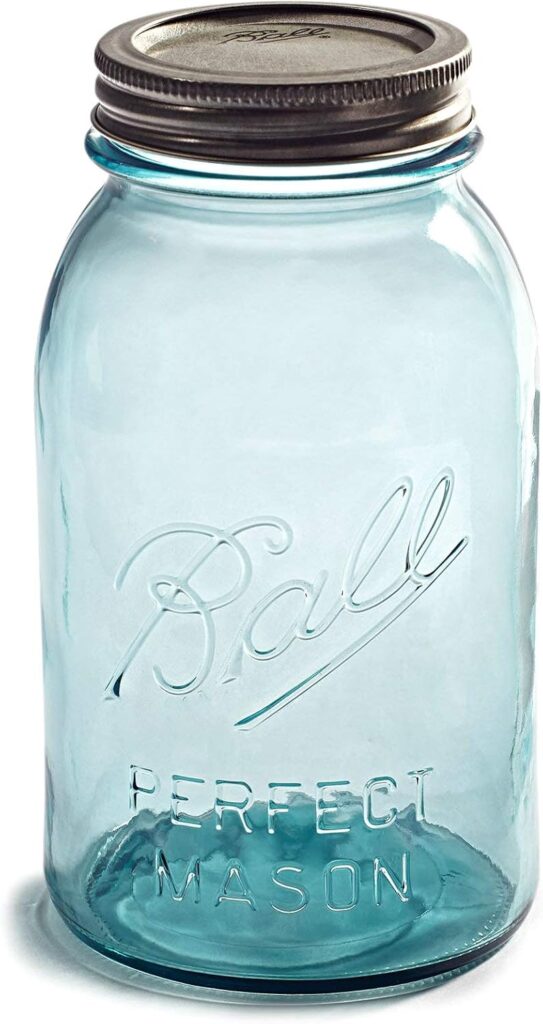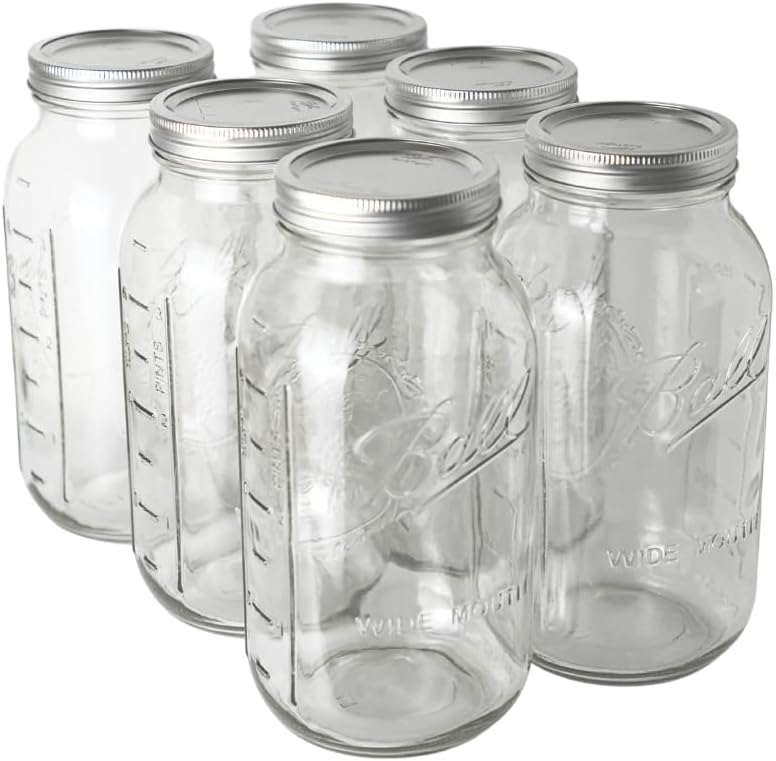You’re standing in your kitchen, admiring those pristine Ball mason jars lined up like soldiers on your counter.
They’re gleaming in the morning light, ready for your next batch of homemade preserves or that trendy overnight oats recipe you’ve been dying to try.
But then a nagging thought creeps in – are these gorgeous glass vessels actually safe? More specifically, are Ball Mason jars lead free?
You’re not alone in this concern. Right from a young age, my grandmother taught me to appreciate the beauty and functionality of heat-resistant glass, but as I grew up, I began to understand that not all glass is created equal.
The question of lead content in glassware has become increasingly important, especially for those of us who use these jars for food storage, canning, and even drinking.
After all, lead exposure isn’t something to take lightly.
Join Safekitchn in this guide as we bring to light what’s really lurking in your favourite glass containers.
THE STRAIGHT ANSWER: ARE BALL MASON JARS LEAD FREE?

Let’s cut through the confusion with crystal-clear facts. Ball mason jars are made from annealed glass, which is lead-free and food safe. They are made from lime, soda, cullet and silica, according to official communications from Jarden Home Brands, the manufacturer.
The good news? Modern Ball mason jars manufactured in recent years are indeed lead-free.
In fact, many canning jar companies have switched to using only lead-free materials in their products.
But is there an exception? Let’s find out.
The Vintage Exception
If you’re a collector of vintage glassware or have inherited some older Ball jars, you’ll want to pay attention to this bit.

This finding from lead testing experts (as we discussed below) reveals that whilst some older Ball jars might contain trace amounts of lead, these levels are considered safe by all current standards.
More importantly, it’s the newer jars that consistently test negative for lead or cadmium content.
UNDERSTANDING LEAD IN GLASSWARE: WHAT YOU NEED TO KNOW
Before we dive deeper into Ball jars specifically, let’s establish why lead in glassware matters.
Lead has historically been added to glass to make it clearer, more brilliant, and easier to work with during manufacturing.
Think of those gorgeous crystal wine glasses, many of which contain lead for that distinctive sparkle and weight.
However, when it comes to food storage and everyday use, lead-free glass is the gold standard for safety.
This is particularly crucial for heat-resistant glass enthusiasts who regularly use their jars for hot liquids, canning, or microwave heating.
THE MANUFACTURING EVOLUTION
Ball Corporation has been manufacturing mason jars since 1884, and like many glassware companies, it has evolved its manufacturing processes over the decades.

The shift towards completely lead-free production represents not just regulatory compliance, but a genuine commitment to consumer safety.
Modern Ball mason jars are manufactured using what’s called soda-lime glass – a combination of:
- Silica (sand) – the primary glass former
- Soda ash (sodium carbonate) – acts as a flux
- Lime (calcium carbonate) – provides stability
- Cullet – recycled glass that aids in melting
This composition creates glass that’s not only lead-free but also perfectly suited for the thermal demands of canning and food storage.
TESTING RESULTS: THE EVIDENCE SPEAKS
Independent testing has provided reassuring evidence about Ball Mason jars’ safety profile. Here’s what the data reveals:
| Test Parameter | Modern Ball Jars | Vintage Ball Jars | Safety Standard |
| Lead Content | Negative/0 ppm | 43 ppm (trace) | <90 ppm (safe) |
| Cadmium Content | Negative | Not detected | <75 ppm (safe) |
| Food Safety Rating | Approved | Approved | FDA compliant |
In summary, the evidence from independent XRF testing and expert analysis shows that modern Ball Mason jars have a reassuring safety profile with lead and cadmium levels below regulatory limits and are FDA-compliant for food safety.
Vintage jars may contain trace lead but remain within safe limits and are generally considered safe for food use, especially when using clear glass Ball jars.
COMPARING HEAT-RESISTANT GLASS OPTIONS
As someone passionate about heat-resistant glass, you might be wondering how Ball Mason jars stack up against other popular brands.
This is where the conversation gets particularly interesting, especially when we consider questions like whether Fire King glass contains lead and whether the Anchor Hocking glass brand has lead content.
The Vintage Glass Landscape
Fire King glassware, manufactured by Anchor Hocking from the 1940s through the 1970s, represents another beloved category of heat-resistant glass.
While I can’t say for certain, readers have used testing kits and found them to be positive.
I err on the side of caution and don’t recommend eating from vintage dishware unless you can confirm it is free of lead.
This cautionary approach makes sense when you consider that manufacturing standards and awareness about lead exposure have evolved significantly over the decades.
BALL MASON JARS VS. OTHER HEAT-RESISTANT OPTIONS
| Brand | Lead-Free Status | Heat Resistance | Best Use |
| Ball Mason Jars | ✅ Confirmed | Excellent for canning | Food storage, canning, drinks |
| Modern Anchor Hocking | ✅ Generally yes | Very good | Baking, storage |
| Vintage Fire King | ⚠️ Testing recommended | Excellent | Decorative (with caution) |
| Pyrex (new) | ✅ Yes | Good | Baking, microwave |
THE LID SITUATION: OFTEN OVERLOOKED BUT IMPORTANT
Here’s something many people don’t consider – the lids. The lids are BPA-free and made of tin-plated steel with a red ring plastisol sealant.
Ball has ensured that not only are their jars lead-free, but the complete system – jar and lid – meets modern safety standards.
This attention to detail matters because what’s the point of having a perfectly safe jar if the lid introduces contaminants?
The tin-plated steel construction with BPA-free sealant ensures your food stays pure from container to contents.
PRACTICAL SAFETY TIPS FOR HEAT-RESISTANT GLASS
Testing Your Collection
If you’ve inherited vintage Ball jars or have collected them over the years, consider these practical steps:
- Purchase a lead testing kit – Available at most hardware stores, these provide quick results
- Check manufacturing dates – Look for date codes on the bottom of jars
- When in doubt, display don’t consume – Vintage jars make beautiful decorative pieces
Maximizing Safety with Modern Jars
For your contemporary Ball Mason jars, here are some expert tips:
- Inspect regularly for chips or cracks that might compromise safety
- Avoid extreme temperature changes to prevent thermal shock
- Use proper canning techniques to maintain the integrity of both the jar and its contents
- Store properly to prevent damage that might affect safety.
THE SCIENCE BEHIND HEAT-RESISTANT GLASS
Understanding why certain glass performs better under thermal stress helps explain why Ball Mason jars have remained popular for over a century.
The soda-lime glass composition used in modern Ball jars offers several advantages:
Thermal Properties
- Low coefficient of expansion – resists cracking from temperature changes
- Even heat distribution – prevents hot spots that could cause breakage
- Chemical stability – won’t leach flavours or chemicals into food
Manufacturing Quality
Modern Ball jars undergo rigorous quality control, including:
- Annealing processes that relieve internal stress
- Thickness consistency for even heat distribution
- Edge finishing that prevents weakness points.
FREQUENTLY ASKED QUESTIONS
Can I use Ball Mason jars for hot liquids?
Absolutely. Ball mason jars are designed to handle the thermal stress of canning, which involves boiling water temperatures.
However, avoid extreme temperature shocks – don’t pour boiling liquid into a cold jar straight from the refrigerator.
How can I tell if my Ball jar is lead-free?
Modern Ball jars (manufactured within the last 20-30 years) are virtually guaranteed to be lead-free due to updated manufacturing standards.
Look for clear date codes on the bottom, and when in doubt, contact Ball Corporation directly.
Are Ball jars better than other heat-resistant glass brands?
Ball jars excel in consistency, availability, and proven food safety standards.
Whilst other brands like Pyrex or Anchor Hocking also produce quality heat-resistant glass, Ball’s long history and rigorous testing make it a reliable choice.
Can I microwave Ball Mason jars?
Yes, Ball mason jars are microwave-safe, but remove metal lids first and avoid extreme temperature changes. Start with shorter heating times and increase gradually.
ENVIRONMENTAL AND HEALTH BENEFITS
Choosing lead-free Ball Mason jars offers benefits beyond just safety:
Health Advantages
- Zero chemical leaching into food or beverages
- No metallic taste that can occur with some metal containers
- Safe for all family members, including children and pregnant women
- Suitable for acidic foods without degradation concerns
Environmental Impact
- Infinitely recyclable glass reduces waste
- Long-lasting durability means fewer replacements needed
- Multipurpose design reduces the need for multiple container types
- Made in America reduces transportation environmental impact.
MAKING THE RIGHT CHOICE FOR YOUR KITCHEN
As someone who appreciates quality heat-resistant glass, your choice of Ball mason jars represents more than just food storage; it’s about embracing a tradition of safety, functionality, and style that spans generations.
The evidence is clear: modern Ball mason jars are not only lead-free but represent some of the safest glass food storage available today.
Whether you’re canning summer vegetables, storing overnight oats, or simply enjoying a refreshing drink, you can use them with complete confidence.
Investment in Quality:
Consider Ball mason jars an investment in your kitchen’s functionality and your family’s health. Unlike plastic containers that may need regular replacement due to staining, odour retention, or wear, quality glass jars can last decades with proper care.
The Collector’s Perspective:
For those drawn to vintage glassware, the key is informed decision-making. Vintage Ball jars can be beautiful additions to your collection, but understanding their composition helps you use them appropriately.
Reserve questionable vintage pieces for decorative purposes and rely on modern jars for food storage and consumption.
CONCLUSION: CRYSTAL CLEAR CONFIDENCE
The question “Are Ball mason jars lead-free?” has a reassuringly straightforward answer: yes, modern Ball mason jars are completely lead-free and safe for all your culinary adventures.
From preserving seasonal produce to creating beautiful layered salads, these jars deliver both safety and style.
Your passion for heat-resistant glass is well-founded – it represents a commitment to quality, sustainability, and health that plastic simply cannot match.
With Ball mason jars, you’re not just choosing a container; you’re choosing a legacy of American manufacturing excellence that prioritizes your family’s well-being.
The next time you’re admiring those gleaming jars on your counter, you can do so with complete confidence.
They’re not just beautiful, they’re also perfectly safe, thoroughly tested, and ready for whatever culinary creativity you have in mind.
For more information about glass safety and testing, visit or contact Ball Corporation directly through their official website.